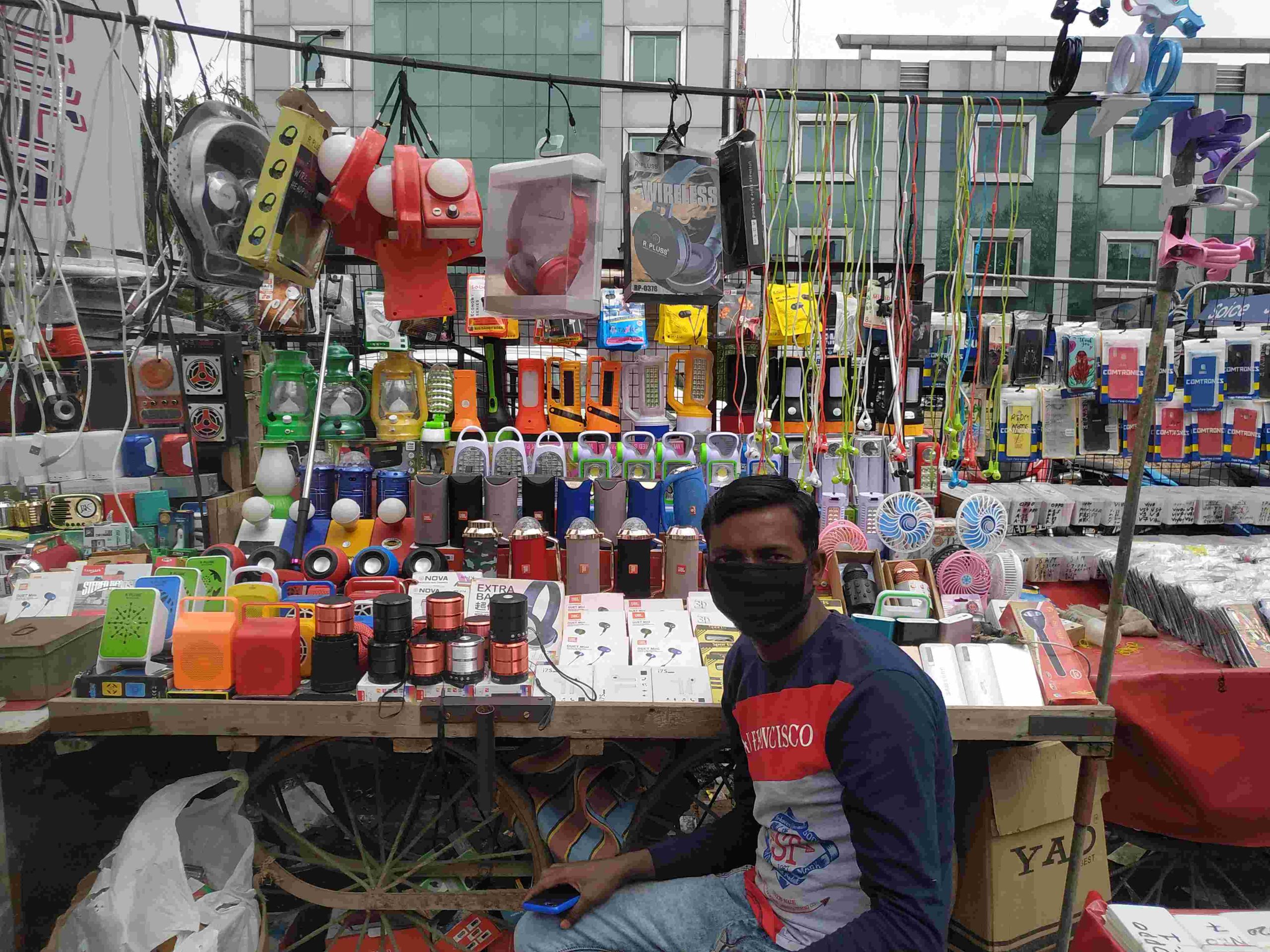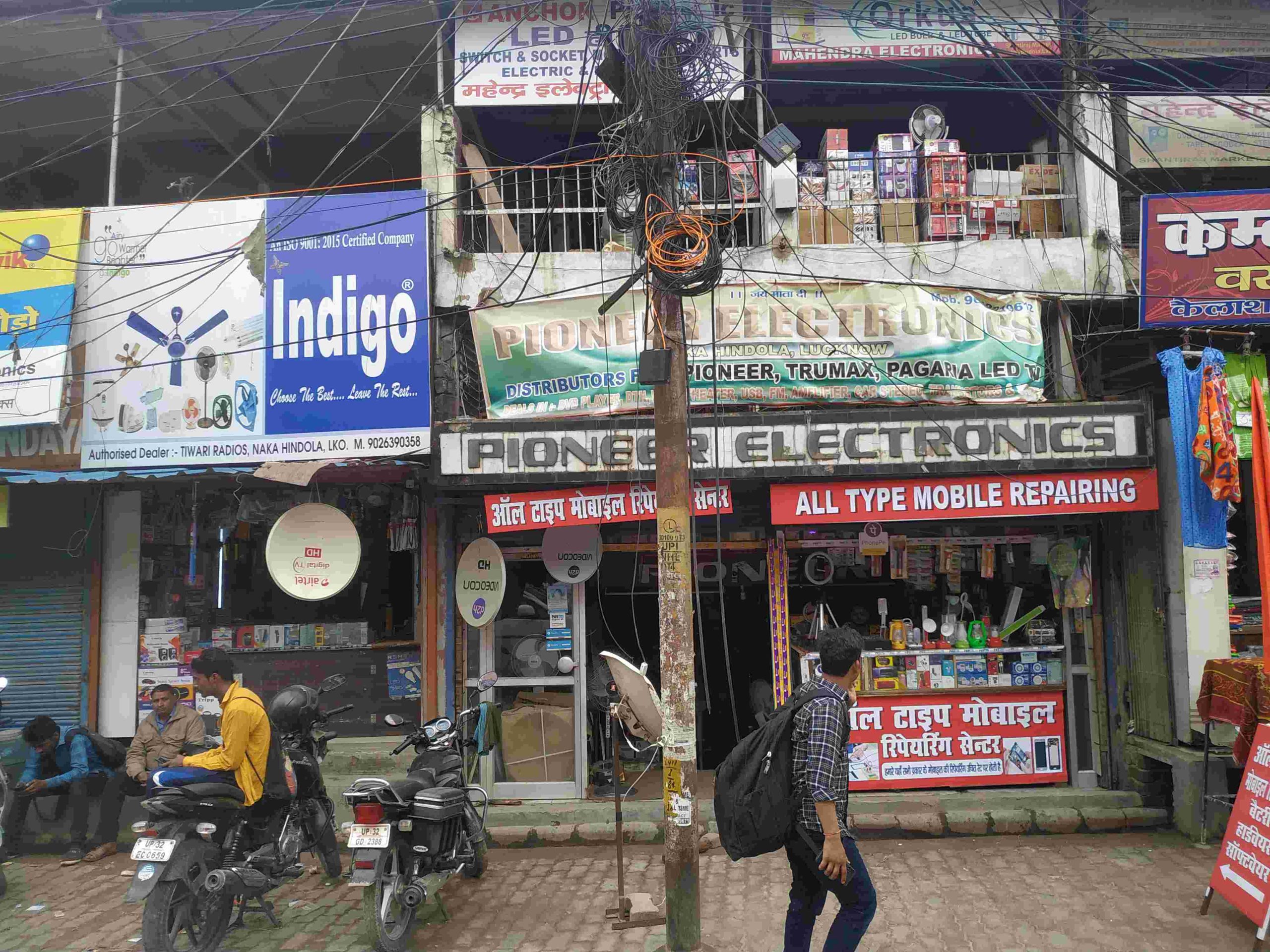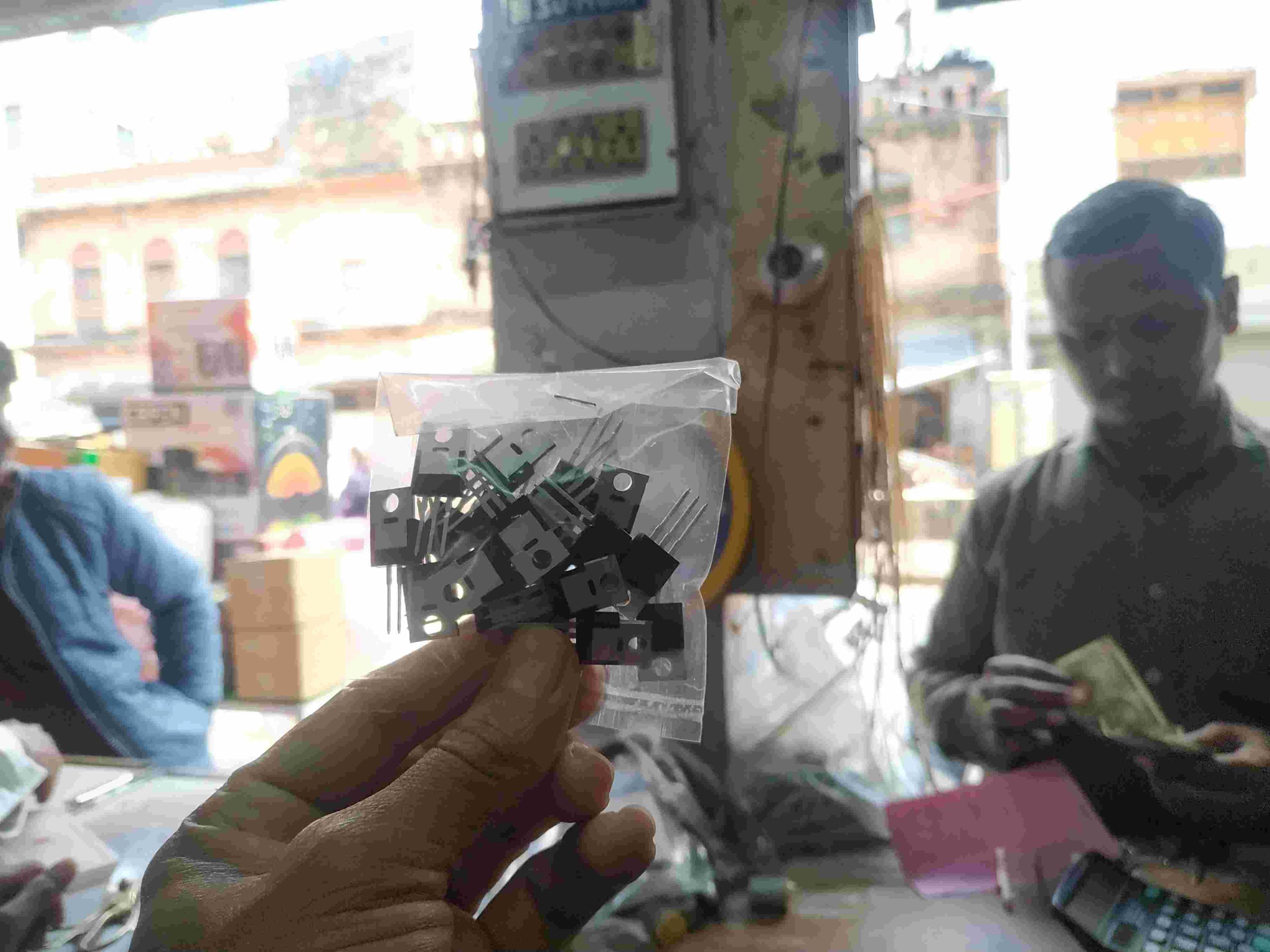“Earlier, I would earn Rs 3,000 daily by selling earphones, LEDs. Now, I hardly earn Rs 600”
India's electronics industry is largely dependent on China. Coronavirus scare has been keeping people away from Chinese goods. This has given a big jolt to the electronic industry in the country

Lucknow
The rise of an emergency situation due to coronavirus has directly affected millions of people. One lakh people are suffering from this disease and 3,500 people have perished due to it. But besides these, there are millions of people whose livelihood is indirectly hit by the disease. Read in the second part of the Gaon Connection series, FiasCorona, how the electronics business is getting affected because of Covid_19.
“No one is buying any earphone or speaker or emergency light or a mobile cover,” said Vinod Kumar, 28, a concerned wayside vendor looking for customers in Uttar Pradesh’s largest electronics market.
The source of his woes lies in the city of Wuhan in China, 3,200 kms away from Lucknow. Coronavirus, COVID 19, believed to be originating from there, has plugged his earnings.
“By this afternoon, I have only managed to sell a set of earphones worth Rs 40, my daily sale is hardly Rs 600-700 whereas until 15-20 days ago, I used to make Rs 2,500-3,000 a day,” said Vinod Kumar wearing a black mask and standing by his stall at the electronics market in Naka Hindola in Lucknow.
The rise of an emergency situation due to coronavirus has directly affected millions of people. Of one lakh people directly affected by the disease, only 75,000 could recover while 3,500 people have perished (till March 7). But beyond these counts, there are millions of people whose lives and livelihood are indirectly hit by the disease.
Vinod Kumar has been selling small electronics items in the market for the past six years. Around 90 per cent of the goods he sells come from China. Vinod lives in Lucknow with his mother, wife and three children in a rented room, which costs him Rs 2,000 a month. In Lucknow alone, there would be hundreds of wayside vendors like Vinod who sell electronics item by the road and whose livelihood is adversely affected as they sustain on their daily sale.
“If this situation continues even after Holi, I may have to change the business. I will keep away from Chinese goods, people like me are dependent on their daily incomes—we earn and only then can we eat,” said Vinod.

From mobile chargers to LED chips, India’s electronics industry is largely dependent on China. In view of the coronavirus, the goods have been held in China so the price of goods already sourced has been increased. On the other hand, fear of disease and the messages circulated about Chinese products on social media have also been keeping people away from Chinese goods. This has jolted the electronic industry in the country.
There are about 900 shops in Naka Hindola Market in Lucknow, which deal in wholesale and retail trade. In addition, there are hundreds of shops in Preet Market, which is one of the largest mobile phone market complex in the city. All these traders buy goods in bulk from Lajpat Rai Market in front of the Red Fort and the Gaffar market of Karol Bagh, both in Delhi. Gaffar Khan is a huge market for mobile accessories. Millions of people, both, directly and indirectly, are associated with these markets.
Ajay Malik, a wholesaler at Lajpat Rai Market, Delhi, informed Gaon Connection over the phone that his business, too, is suffering losses due to the fear amongst people. He said, “This is the time of global slowdown in the electronics industry. Our trade which was already reeling under the economic slowdown has also been hit due to coronavirus.”
Delhi’s Lajpat Rai market is Asia’s largest market, followed by China’s Wuhan market. Wuhan is the city wherefrom coronavirus is believed to have spread to all over the world. Apart from Lajpat Rai Market, Nehru Place in Delhi, Lamington Road in Mumbai, Hazratganj besides Naka in Lucknow and SP Road in Bengaluru are the hubs of electronics, computer, TV, mobile phones and accessories in India.
Vikas Kukreja, who supplies products from Delhi to many parts of the country, informed us over the phone, “Most of the components of electronics goods come from China. Since the production has stopped there, the goods are not coming into the country and the goods which are there have become costlier. Secondly, fewer people from outside Delhi are coming to shop. Overall, the electronics business has been affected by 40 per cent.”
According to Vikas, the past few days have been very challenging for the entrepreneurs like him, “The recent Delhi riots happened far away from our market but the out of town customers could not come. Now there is so much fear of coronavirus that people wary of coming. So the market is also dependent a lot on mindset.”
Satyadev Tiwari, owner of the wholesale business of electronics parts in the Naka Hindola market for the past 20 years, said, “Coronavirus has a bearing on every trade drawing its raw materials from China. Mobile phones, TV and other electronics items (board based with IEC-condenser, etc.), have become costlier by 20 per cent, as many components of even made in India products come from China.”

Replying as to how much sale was affected, Vinod Kumar pointed to a red speaker upon his stall, and said, “I was selling this speaker for Rs 150 till 20 days ago. But now I am selling it for Rs 250 because it is coming costlier from my suppliers. The customer is unwilling to buy it at a higher price and besides, the goods that are known as Chinese have no takers now.”
Satyadev Tiwari, citing an example of how coronavirus has affected the business, said, “The motorcycle and scooter batteries, which used to cost Rs 600 in bulk orders, have now shot up to Rs 900 because even though the battery is made in the country, the item of sealing them from top comes mostly from outside. Secondly, the bigger LED TVs have become costlier because most of their components are from China. The importers have hiked the price at their end. It had hit us badly in February, now there is some relief.”
A double whammy: The markets already hit by Coronavirus fear suffer the weather’s ire too
The shopkeepers and businessmen troubled by coronavirus fear have come across a new challenge. Mohd Assad, 45, a shopkeeper, who had come from Ambedkar Nagar in Uttar Pradesh to Lucknow to collect goods, said, “Though not majorly affected due to corona, we are still not doing good as there is no customer in the market because of the rains and hailstorm occurring in the last few days.”
In 2019, floods, droughts, storms and excessive rainfall resulted in major losses for the farmers. In 2020, from the last week of February to March 7, many crops have been damaged by hailstorm and rain in Rajasthan, Punjab, Haryana, UP, Bihar and Maharashtra. Talking recently to Gaon Connection, a large number of farmers have admitted that their Holi has been ruined.
Vinod Kumar, who works from Naka Hindola, hails from Gopalpur village in Sitapur district of Uttar Pradesh. The state had faced a severe hailstorm on March 5. Vinod informed us that the wheat crop upon his fields too had been damaged. “No economic relief can be expected from the village now. The rations may also have to be now purchased in Lucknow,” added Vinod.
On the condition of anonymity, a big exporter of Delhi informed us that coronavirus’ impact upon the business is not so much because the goods for the current season had already come, the rates had increased because the importers took advantage of the opportunity. But when the importers realized that the market opportunities are lost by raising the rate and the customers are backing out, they opened new containers and regularized the rates.
This time the New Year in China had been celebrated on 25th January, before this the holidays had started and the work in factories had been stopped. Soon after, February witnessed the outbreak of coronavirus which not only stopped factory production but also export-imports. This has not only affected many countries across the world but also millions of people like Vinod whose livelihood associated with this is also getting affected.

Mobile accessories are becoming expensive, the markets are still
Right behind Vinod’s stall is Preet market, the biggest mobile market in the state. Preet market has been still for the past few days. There may be many brightly illuminated showrooms in the markets full with Chinese colourful LEDs and mobile phones but there are hardly any customers in these markets.
As soon as the reporter entered the market, he was eagerly greeted by the sales boy reaching over a counter, “What do you want, mobile, accessories or a screen change? We’d do everything … ”
Hearing a ‘no’ this man named Manish Kashyap looked disappointed. He works for Maa Durge Enterprise in the market. Manish, when asked about the market’s situation, informed us that the market is in pits as most of the mobile goods come from China. “The existing goods are getting costlier. People also come here to replace their mobile screen etc but the folder (screen and display) which would earlier cost Rs 1,000 are now being sold at Rs 1,500-1,600. The tempered glass screen has also become 20 to 30 per cent costlier,” said Manish.
He added, “As for now, the market conditions have started to improve. But this is because we have the goods right now. But if the goods do not come for the next one or two months, there will be a problem. We had thought of procuring some goods from Taiwan but there too was the problem. Around 70 per cent of the goods for products like LED TVs and home theatres come from China. so, the sales of these would surely be affected.”
Vinod Kumar from Naka market does not know about the extent of damage or duration of coronavirus problem. He said, “If such remains the situation after Holi, I may have to change the business, I will simply not pick up the Chinese goods, after all, people like me eat what we earn that day.”
Read part one of the series here

